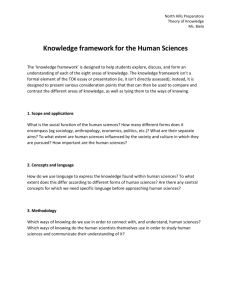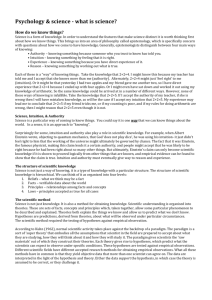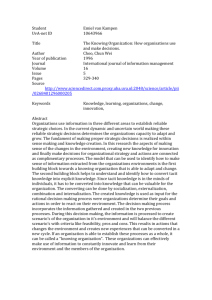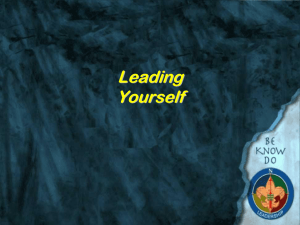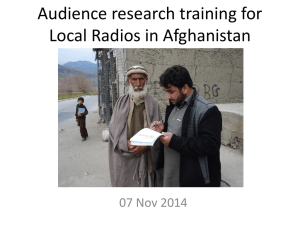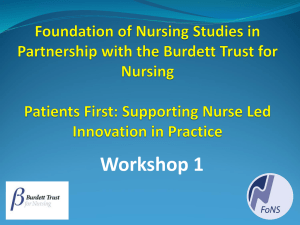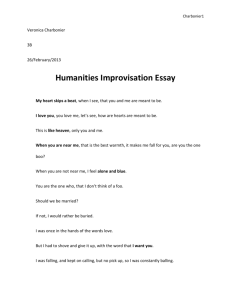Linking Questions
advertisement
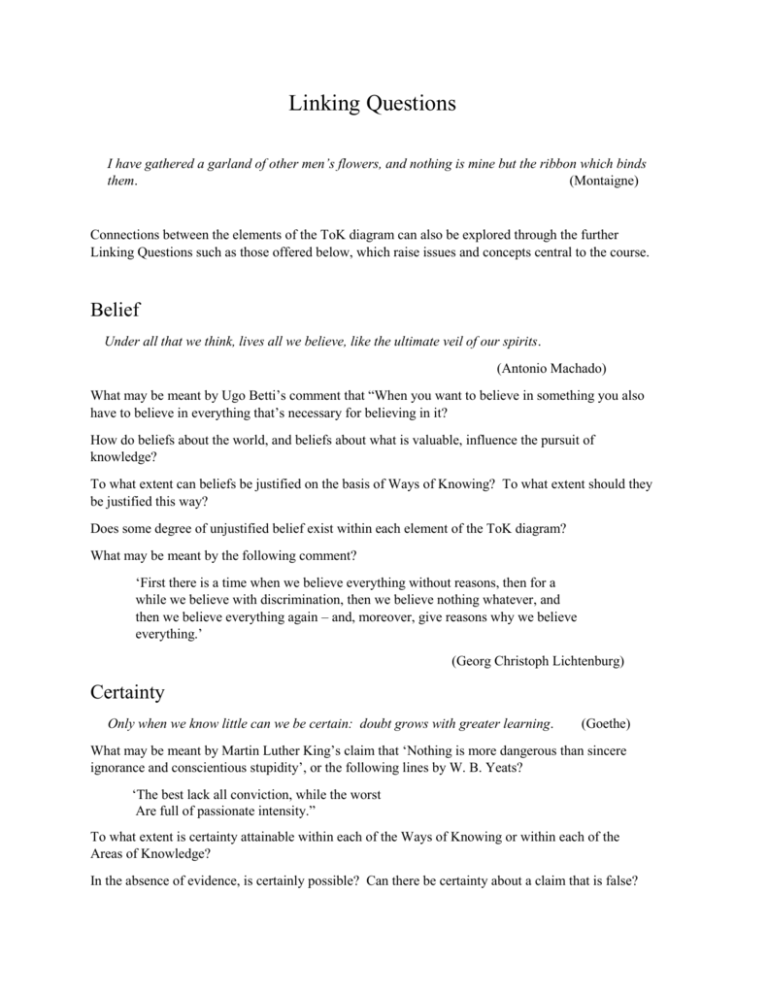
Linking Questions I have gathered a garland of other men’s flowers, and nothing is mine but the ribbon which binds them. (Montaigne) Connections between the elements of the ToK diagram can also be explored through the further Linking Questions such as those offered below, which raise issues and concepts central to the course. Belief Under all that we think, lives all we believe, like the ultimate veil of our spirits. (Antonio Machado) What may be meant by Ugo Betti’s comment that “When you want to believe in something you also have to believe in everything that’s necessary for believing in it? How do beliefs about the world, and beliefs about what is valuable, influence the pursuit of knowledge? To what extent can beliefs be justified on the basis of Ways of Knowing? To what extent should they be justified this way? Does some degree of unjustified belief exist within each element of the ToK diagram? What may be meant by the following comment? ‘First there is a time when we believe everything without reasons, then for a while we believe with discrimination, then we believe nothing whatever, and then we believe everything again – and, moreover, give reasons why we believe everything.’ (Georg Christoph Lichtenburg) Certainty Only when we know little can we be certain: doubt grows with greater learning. (Goethe) What may be meant by Martin Luther King’s claim that ‘Nothing is more dangerous than sincere ignorance and conscientious stupidity’, or the following lines by W. B. Yeats? ‘The best lack all conviction, while the worst Are full of passionate intensity.” To what extent is certainty attainable within each of the Ways of Knowing or within each of the Areas of Knowledge? In the absence of evidence, is certainly possible? Can there be certainty about a claim that is false? Culture Just because we aren’t all the same doesn’t mean we have nothing in common. (Kirk Kerekes) What beliefs or knowledge, if any, are independent of culture? How do cultures differ with respect to the Ways of Knowing and Areas of Knowledge which they value above others? How would you justify valuing one way, or one area, more than another? If one looks at most Western complications of questions, it seems that most are attributed to dead, white, European males. Why might this be so? To what extent does the identity of the author of a quotation influence how its content is interpreted and how seriously its ideas are taken? What does the choice of quotations in this guide signify? Evidence Tell a man there are 300 billion stars in the universe and he’ll believe you. Tell him a bench has wet paint on it and he’ll have to to touch to be sure. (Anon) What constitutes ‘good evidence’ within the different Ways of Knowing and Areas of Knowledge? Do perception, reason, and emotion have the same weight in providing ‘good evidence’ for claims within the different Areas of Knowledge? Must evidence always be expressed in words? What could be meant by ‘A mind all logic is like a knife all blade. It makes the hand bleed that uses it’? (Tagore) Is technology, in the form of the information processed by computers, authoritative in the same way that humans, authors of texts and lecturers are? Which, if either, is the more definitive: facts from books, or facts from databases? Can a fact exist without a context? What does Luigi Piarandello mean by his comment that ‘My opinion is a view I hold until–well–until I find out something that changes it’? Explanation The reverse side also has a reverse side. (Japanese proverb) What characteristics must an explanation posses to be considered ‘good’ within the different Ways of Knowing and Areas of Knowledge? Must all ‘good explanations’ make predictions with the same degree of success? Where would explanations about each Area of Knowledge rate, in a continuum from ‘stories’ through ‘models’ to ‘reality’? What is ‘reality’? What may be meant by Eugene Ionesco’s statement: ‘Explanation separates us from astonishment, which is the only gateway to the incomprehensible’? Interpretation To what extent do the classification systems (label and categories) adopted in the pursuit of knowledge affect the knowledge we obtain? How does interpretation occur within the Areas of Knowledge? Within the Ways of Knowing? Are some Ways of Knowing less open to interpretation than others? Intuition Intuition will tell the thinking mind where to look next. (Jonas Salk) In attempting to understand what is commonly called ‘intuition’, is it best to think of it as a rapid cognitive process or perhaps, as some say, an irrational or unmediated awareness of phenomena? Germaine Greer once commented that ‘The frequently celebrated female intuition…is after all only a facility for observing tiny insignificant aspects of behaviour and forming an empirical conclusion which cannot by syllogistically examined.’ Does ‘feminine intuition’ exist? Do men’s Ways of Knowing differ from those of women? To what extent is intuition to be taken seriously in the different Areas of Knowledge? Technology Before you become too entranced with gorgeous gadgets and memorized video displays, let me remind you that information is not knowledge, knowledge is not wisdom, and wisdom is not foresight. Each grows out of the other and we need them all. (Arthur C. Clarke) Although technology is certainly not new, rapid and accelerating in the fields of information and communication technology are commonly recognized as having profound effects on what we do and can know. Technology offers a means of communication that, more than any other, crosses cultures. In what ways has technology expanded knowledge? In what ways has it affected how much we value the different Ways of Knowing and Areas of Knowledge? What fields of study have been founded on technological developments? Does information technology, like deduction, simply allow the knower to arrange existing knowledge in a difference way, without adding anything, or is this arrangement itself knowledge in some sense? To what extent do information and communication technologies influence the way we think about the world? To what extent do these technologies determine what we regard as valuable or important? Could it be argued that the increasing global dominance of a particular form of information technology gives rise to an increasing uniformity of thinking? Can it be said that every new technology affects the beliefs of individuals and societies, in both positive and negative ways? How can the impact of new technologies be predicted? How reliable are the predictions? What is the difference between data, information, knowledge and wisdom? Are there technologies specifically designed to impart data, information, knowledge and wisdom? In what ways do information and communication technologies influence the accessibility of information, and the reasons for believing such information to be true? Who controls such technologies, and what are the effects of such control? What did Sydney Harris mean when he said that ‘The real danger is not that computers will begin to think like men, but that men will begin to think like computers’? What is meant by Akio Morita’s claim that ‘You can be totally rational with a machine. But if you work with people, sometimes logic has to take a back seat to understanding’? Truth They who know the Truth are not equal to those who love it, and they who love it are not equal to those who delight in it. (Confucius) How useful are the truth tests of coherence, correspondence and pragmatism in arriving at knowledge? Is there such a thing as ‘false knowledge’? What is the difference between ‘justified true belief’ and ‘true belief’? What is meant by the following statement? ‘As the wise test gold by burning, cutting and rubbing it…so are you to accept my words after examining them and not merely out of regard for me.’ (Buddha) To what extent does truth of a sentence depend on the language used to express it? Values To live is, in itself, a value judgment. To breathe is to judge. (Albert Camus) How do values underlie the pursuit of truth in the different Areas of Knowledge? How, if at all, do they influence methodology? To what extent do the different Ways of Knowing and Areas of Knowledge influence the values adopted by individuals and societies? In what ways do values affect our representatives of the world, for example, in language, maps, visual images, or statistics? When might a persuasive representation be praised as ‘effective’, or, in contrast, condemned as ‘manipulative’? At the end of nine of ten nights he realized, with a certain bitterness, that he could expect nothing from those students who accepted his teaching passively, but he could of those who sometimes risked a reasonable contradiction. (Jorge Luis Borges)
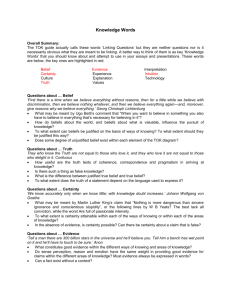

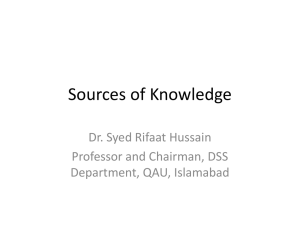
![Transformational Change [Powerpoint Presentation]](http://s2.studylib.net/store/data/005447411_1-da0a83bd34bdb90183940ab700125003-300x300.png)
